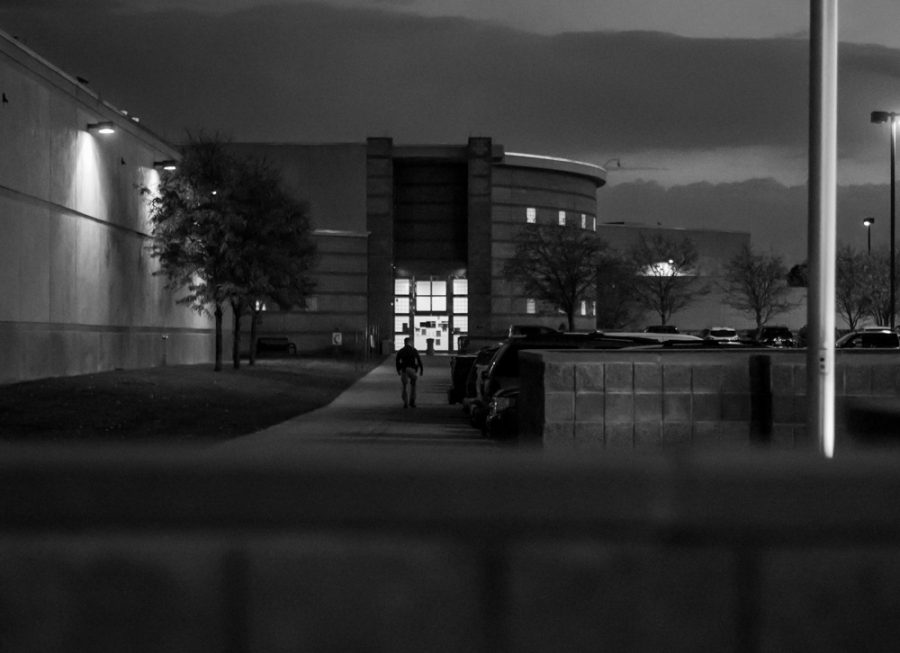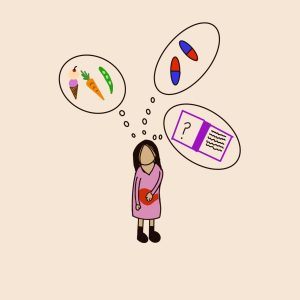Lezaic: Incarcerated People Deserve Good Healthcare
A police officer enters the Salt Lake Metro Jail in South Salt Lake City on Election Day, Nov. 3, 2020. (Photo by Jack Gambassi | The Daily Utah Chronicle)
February 14, 2023
The carceral system is a cesspool of state-sanctioned violence and human rights violations. That said, it’s a relief to see new legislation removing some obstacles for incarcerated people. H.B. 111, titled “Inmate Treatment Amendments” and sponsored by Rep. Christine Watkins, calls for giving incarcerated people medication-assisted treatment if they were active in a program prior to incarceration. While the bill itself is a step in a positive direction, its existence is a reflection of a larger problem.
The Need for MAT Programs
Watkins attributes the bill’s creation to one of her constituents, a nurse practitioner who wanted Utah’s jails to allow medical workers to treat people with substance use disorder. Carceral facilities don’t adequately provide the necessary healthcare incarcerated people need, and often disrupt treatments that were ongoing before incarceration. H.B. 111 seeks to address this disruption and forced cessation of medication-assisted treatment programs.
MAT programs consist of a combination of medication, therapy and counseling. These programs exist to help people recover from addiction and prevent relapse. It’s crucial to allow incarcerated people to continue their treatments while in jail — they need a fighting chance against a system that seeks to suck them back in on the basis of reoffending. Additionally, it’s important to ensure “that the treatment continues so that we don’t have people suffering from withdrawals, becoming really sick or even dying,” Watkins said. The significance of MAT reaches far beyond the person’s time in jail as well. According to the American Civil Liberties Union, “MAT reduces the risk of death from any cause by 85%, and the risk of death from an overdose by 75% in the weeks following release.”
H.B. 111 could also help with medical staff shortages in jails by bringing in outside MAT-specialized professionals. Ginny Robertson, a retired nurse practitioner who volunteers with Utah Prisoner Advocate Network, confirms this. “It needs to be that way, because when you don’t use appropriate people that are knowledgeable of the medications … people with chronic illness [don’t get] appropriate care,” she said.
Potential Limitations
But H.B. 111 is not without issues. Eliza McKinney of the Salt Lake Community Bail Fund said, “We think that it’s a step in the right direction because so many people — especially people with chronic conditions — don’t get treatment when they’re in jail. Especially if it’s a short-term, pre-trial stay. And that can have huge, horrible ramifications.”
However, “It’s more about if these programs allow for autonomy from the incarcerated people,” McKinney said. “Often when they’re introduced into jails, it can be quite coercive. If someone is prescribed a medication, they can be forced into taking it. They don’t get a lot of say on what doctor they get to see. If they’re having an issue with a provider, they’re not really allowed to switch providers. So the more autonomy that the program has, the better for the client and the incarcerated people themselves.”
Considering Utah’s extensive history of medical abuse of incarcerated people, fearing disrespect for their autonomy is more than warranted. This abuse doesn’t suddenly stop when it comes to programs such as MAT. In cases across the country, carceral facilities have denied or inappropriately administered dosages, cut treatment plans short and denied the programs to people who weren’t previously clients. They’ve also threatened to kick people off the programs for disciplinary reasons or used the treatments as an excuse to keep people incarcerated.
McKinney recalled the local unjust treatment of incarcerated people. “There have been so many wrongful death suits in jails throughout Utah, especially with suicidal people or people having withdrawal from addiction issues they’re having,” they said. “It’s not standardized, what kind of treatment people receive in jails throughout Utah. So there’s nothing that says they need to provide them with medically assisted withdrawal.”
SLCBF noticed other issues with the bill’s language. “It says it’s all under the sheriff’s discretion. So this bill is really more of a suggestion for jails, it’s not really a policy,” McKinney said. “It creates so many loopholes in a system, [so] jails still have the choice to do whatever they want in regards to medication because it’s always just at the local sheriff’s discretion, which is a huge issue.”
Because this bill is more of a suggestion than an actual policy, incarcerated people and their families have no legal recourse, they noted. “I think that if they want to enact these policies, they need to have clear, set guidelines that each jail has to follow, rather than just making suggestions for jails,” Mckinney said.
The Work Cannot Stop There
Robertson also expressed frustration at the obstacles that prevent incarcerated people from getting the care they deserve. “The state prison does not have a program at all for those meds, for Suboxone or Methadone,” she said. “There’s a ton of grant money out there and I would hope that they would try to do that. But at this point, they don’t. Their view is that you don’t need that.”
But she remains hopeful and would like to see H.B. 111 pave the way for a similar bill regarding state correctional facilities. “I feel like this transition is going to help, it’s going to be a stepping stone for those who are incarcerated in the prisons,” she said. “For instance, if someone’s in there for a big crime, they could be in the county jail for 9 to 18 months before they’re ever found guilty, or even longer. So if they have to go that long and not get their medications or get back on the medications they were on before? This bill will help with that.”
McKinney added, “This bill is better than not having the bill. But we still feel like legislators have their focus in the wrong direction and they’re not thinking more holistically about what really impacts a person’s health and how to get them hooked up with the care and treatment that they need, which is getting them out of jail in the first place.”












